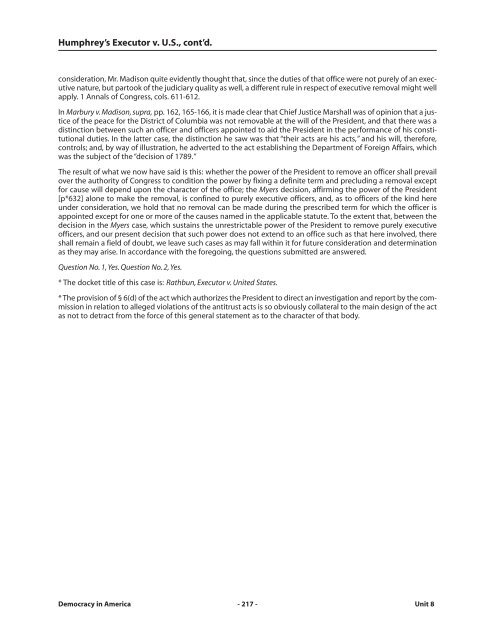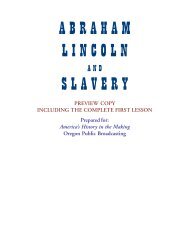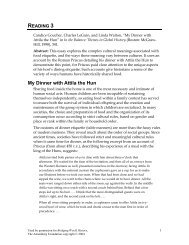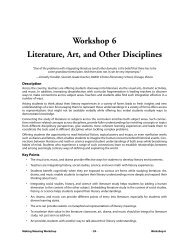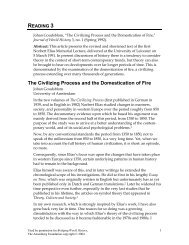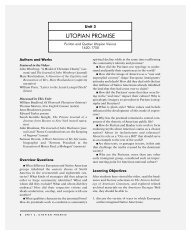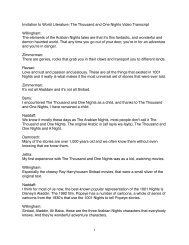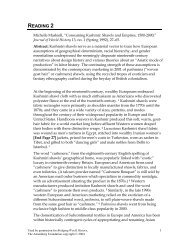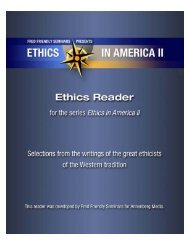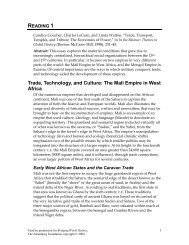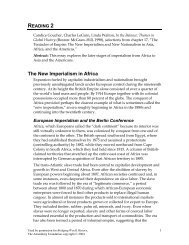Download Unit 8 Readings, Bureaucracy: A Controversial Necessity
Download Unit 8 Readings, Bureaucracy: A Controversial Necessity
Download Unit 8 Readings, Bureaucracy: A Controversial Necessity
Create successful ePaper yourself
Turn your PDF publications into a flip-book with our unique Google optimized e-Paper software.
Humphrey’s Executor v. U.S., cont’d.<br />
consideration, Mr. Madison quite evidently thought that, since the duties of that office were not purely of an executive<br />
nature, but partook of the judiciary quality as well, a different rule in respect of executive removal might well<br />
apply. 1 Annals of Congress, cols. 611-612.<br />
In Marbury v. Madison, supra, pp. 162, 165-166, it is made clear that Chief Justice Marshall was of opinion that a justice<br />
of the peace for the District of Columbia was not removable at the will of the President, and that there was a<br />
distinction between such an officer and officers appointed to aid the President in the performance of his constitutional<br />
duties. In the latter case, the distinction he saw was that “their acts are his acts,” and his will, therefore,<br />
controls; and, by way of illustration, he adverted to the act establishing the Department of Foreign Affairs, which<br />
was the subject of the “decision of 1789.”<br />
The result of what we now have said is this: whether the power of the President to remove an officer shall prevail<br />
over the authority of Congress to condition the power by fixing a definite term and precluding a removal except<br />
for cause will depend upon the character of the office; the Myers decision, affirming the power of the President<br />
[p*632] alone to make the removal, is confined to purely executive officers, and, as to officers of the kind here<br />
under consideration, we hold that no removal can be made during the prescribed term for which the officer is<br />
appointed except for one or more of the causes named in the applicable statute. To the extent that, between the<br />
decision in the Myers case, which sustains the unrestrictable power of the President to remove purely executive<br />
officers, and our present decision that such power does not extend to an office such as that here involved, there<br />
shall remain a field of doubt, we leave such cases as may fall within it for future consideration and determination<br />
as they may arise. In accordance with the foregoing, the questions submitted are answered.<br />
Question No. 1, Yes. Question No. 2, Yes.<br />
* The docket title of this case is: Rathbun, Executor v. <strong>Unit</strong>ed States.<br />
* The provision of § 6(d) of the act which authorizes the President to direct an investigation and report by the commission<br />
in relation to alleged violations of the antitrust acts is so obviously collateral to the main design of the act<br />
as not to detract from the force of this general statement as to the character of that body.<br />
Democracy in America - 217 - <strong>Unit</strong> 8


